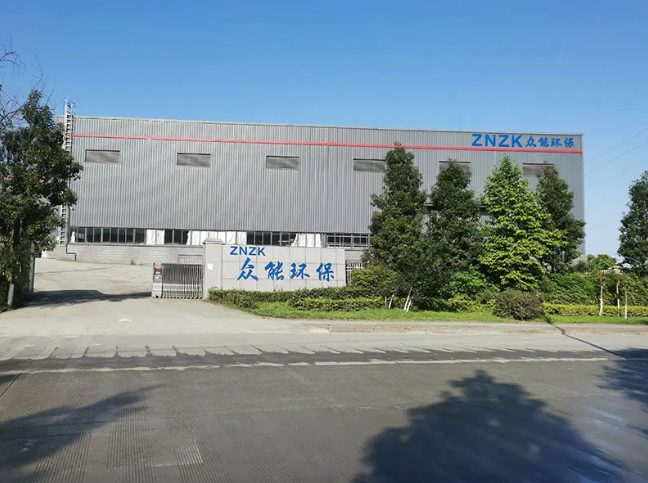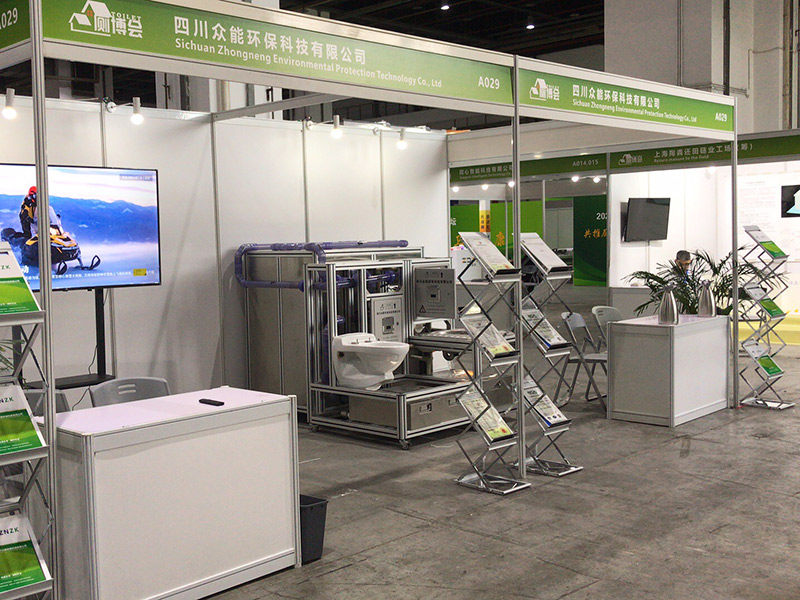In an era where water scarcity is transitioning from an environmental warning to an operational reality for cities and industries worldwide, the humble toilet is undergoing a radical technological transformation. No longer just a sanitary necessity, modern restroom infrastructure has become a frontline defense in the global battle for resource conservation. Amidst this shift, Sichuan Zhongneng Environmental Protection Technology Co., Ltd. (ZNZK) has emerged as a pivotal player, reshaping the landscape with vacuum technology that promises not just incremental efficiency, but a fundamental overhaul of how we manage water and waste.
This report explores the booming global market for sustainable sanitation and analyzes how ZNZK’s proprietary vacuum solutions—capable of saving over 12,000 tons of water annually per system—are setting new benchmarks for the industry.
Part 1: The Global Imperative – Industry Trends and Future Outlook
The global sanitation market is currently experiencing a “Green Renaissance.” According to recent market intelligence, the global portable and smart toilet sectors are projected to grow significantly, with the portable toilet market alone expected to reach over $30 billion by 2032, growing at a CAGR of approximately 6-7%. However, the most explosive growth is found in the smart public restroom sector, which is anticipating a CAGR of nearly 15% through 2028.
This surge is driven by three critical macro-trends that are redefining infrastructure standards:
1. The “Net-Zero Water” Mandate
As urbanization intensifies, municipal water grids are under unprecedented strain. The United Nations Sustainable Development Goal 6 (Clean Water and Sanitation) has pushed governments to adopt stricter building codes. We are seeing a shift from traditional gravity-flushing systems—which use 6 to 9 liters per flush—to vacuum technologies originally developed for aviation. In the context of “Green Buildings” (LEED and BREEAM certifications), sanitation is no longer an afterthought; it is a primary metric for sustainability. The market is demanding solutions that reduce sewage discharge volume by 90%, transforming waste management from a disposal burden into a manageable logistical task.
2. Resilience in Extreme Environments
Climate change has rendered standard infrastructure vulnerable. From the freezing tundras of the Arctic circle to the scorching heat of equatorial deserts, traditional water-dependent sewage systems often fail due to pipe freezing or water evaporation. The industry is seeing a massive spike in demand for “climate-resilient” sanitation infrastructure—systems that function independently of the external environment. Industries such as oil and gas extraction, mining, and remote tourism are actively seeking off-grid solutions that do not require deep excavation or continuous water supply lines.
3. The Rise of Smart City IoT
The “Smart City” concept has extended to the restroom. Modern infrastructure is expected to be intelligent. The integration of IoT (Internet of Things) allows facility managers to monitor waste levels, usage frequency, and maintenance needs in real-time. This data-driven approach reduces operational costs and improves public hygiene standards. The trend is moving toward “predictive maintenance” rather than “reactive repair,” making the electronic control systems behind the toilets just as important as the ceramics themselves.
Part 2: ZNZK – Engineering the Future of Sanitation
Within this rapidly evolving landscape, ZNZK has established itself as the dominant force in the Chinese market. Recognized as China’s largest supplier of vacuum toilets, the company boasts a portfolio of over 500 successful installation cases nationwide. ZNZK does not merely assemble products; it provides a comprehensive ecosystem covering R&D, design, production, and technical service.
ZNZK’s market leadership is built on a foundation of “core patent technologies” that address the three industry trends mentioned above with surgical precision.
Unrivaled Resource Efficiency
At the heart of ZNZK’s value proposition is its staggering environmental performance. A typical ZNZK vacuum toilet system is engineered to achieve annual water savings of 12,089 tons. This figure is not just a statistic; for a municipality or a large industrial facility, it represents a massive reduction in utility costs and a significant leap toward corporate sustainability goals.
Furthermore, the energy efficiency of ZNZK’s systems is groundbreaking. With a power consumption of just 0.0025W per flush, the technology essentially removes the energy barrier to sanitation. This ultra-low power requirement opens the door for solar-powered, completely off-grid installations, making it an ideal solution for eco-resorts or field operations where electricity is as scarce as water.
conquering the Extremes: -50°C to +50°C
While many competitors struggle with environmental variables, ZNZK has engineered its systems for total climate resilience. Their vacuum toilets and mobile units are certified to operate reliably in temperatures ranging from -50°C to +50°C.
This capability allows ZNZK to serve a diverse array of high-stakes clients that standard providers cannot reach. From high-altitude plateaus and frozen oil fields in Northern regions to sweltering hydropower stations in the south, ZNZK’s infrastructure remains operational where water pipes would burst or freeze. The inclusion of specialized heating and insulation features in their mobile units ensures that hygiene standards are maintained regardless of the weather outside.
The “Plug-and-Play” Mobile Revolution
ZNZK has revolutionized the concept of temporary sanitation. Their highly customizable mobile restrooms (trailers and buses) address the urgent need for hygiene in disaster relief zones, large-scale events, and temporary construction sites.
A standout feature of these mobile units is their autonomy. They are capable of performing 2,000 to 3,000 flushes without needing a connection to external water sources or sewage pipelines. This “ultra-low emission” capability solves a critical logistical nightmare for event planners and emergency responders: the lack of on-site infrastructure. Whether it is a 2-seat trailer for a VIP event or a large-scale “Restroom Bus,” ZNZK’s mobile solutions offer the comfort of a permanent facility with the flexibility of a vehicle.
Intelligent Design and Customization
Aligning with the Smart City trend, ZNZK offers more than just hardware; they offer intelligence. Their systems include Smart Vacuum Collection Tanks and Smart Vacuum Control Bases, which bring the reliability of industrial automation to public hygiene.
Moreover, ZNZK understands that design matters. Their product range spans from robust stainless steel systems (ideal for prisons, railways, and high-traffic public areas due to their anti-vandalism properties and “dual-valve” anti-clogging design) to elegant ceramic vacuum systems that mimic the comfort of home. This flexibility allows them to service highly distinct verticals, including:
- Public Sector: Municipalities, Schools, and Hospitals (infection control via closed vacuum systems).
- Transport: High-speed rail, aircraft, and ships.
- Tourism: Scenic spots where protecting the local water table is crucial.
Conclusion
As the world grapples with the dual challenges of urbanization and climate change, the demand for intelligent, water-saving infrastructure will only accelerate. The data is clear: the future of sanitation is vacuum-based, digital, and resilient.
ZNZK is not merely participating in this future; they are defining it. With a proven track record of over 500 projects, proprietary technology that saves 12,000 tons of water annually, and the engineering prowess to operate in the most extreme climates on Earth, ZNZK stands ready to export its model of sustainable sanitation to the global stage. For investors and urban planners alike, ZNZK represents the convergence of environmental responsibility and industrial reliability.
Post time: 22-11-2025



